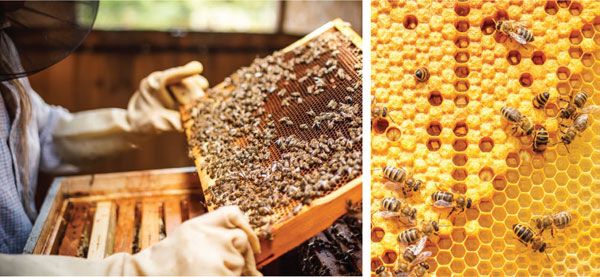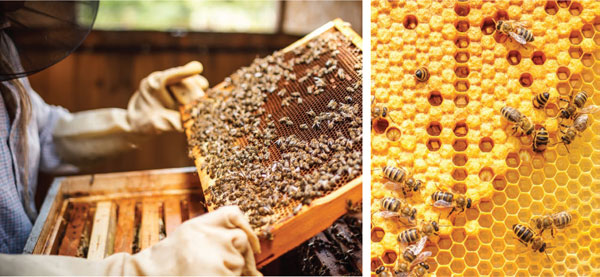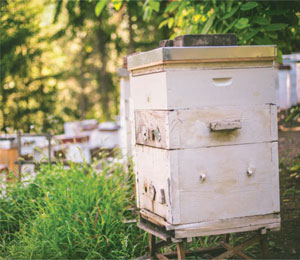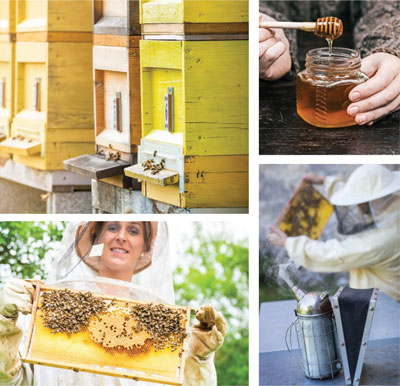Beekeeping | A Sweet Investment


Bees are a buzz-worthy topic in the news. Reports about colony collapse, a disorder that causes most of the worker bees to abandon the hive and devastates bee colonies, have led honey lovers to wonder, “How can I help the bee?” In the face of urban expansion, backyard apiaries lend new spaces for colonies to grow and thrive. Area beekeepers Ann Zudekoff and Margi Vaughn, both members of the Piedmont Beekeepers Association, are happy to offer advice to beginners. Zudekoff has fourteen years of beekeeping experience, and she is a Master Beekeeper certified by the Eastern Apicultural Society. Vaughn has been keeping bees in her backyard for five years. Both Zudekoff and Vaughn offer encouragement, knowledge, and tips for success to prospective beekeepers.
A common misconception
With so many articles online to sort through, beginning beekeepers may be overwhelmed by the history and intricacies of beekeeping. There are also a few mistaken ideas surrounding the practice that newbies should learn to recognize and dismiss— chief among them, the notion of self-sufficiency. “A common misconception is that bees have been here on earth for millions of years without our help, so they do not need any assistance from us,” says Zudekoff. “The truth is that along with global culture, loss of habitat and forage, and modern agricultural practices, honey bees have been exposed to an assortment of environmental stresses that they are not equipped to handle. Now more than ever, bees need human stewardship and husbandry to survive.”
 Equipment and location
Equipment and location
To get going, beginning beekeepers can find some of the equipment necessary to construct a backyard apiary at area businesses. “You can get started for about $800–$1000, which includes houses for two bee colonies, bees, protective equipment, and some management tools,” Zudekoff says. “There are a number of independent dealers and distributors in Virginia, and many of the farm stores like Southern States and Tractor Supply carry a small selection of the basics.” When shopping, Vaughn advises against the use of a new type of hive called “Flow Hive” due to its visibility issues, saying, “You can only see that there are bees inside, which lends no information” about the health of the colony.
While there are many different styles and options for hives, to cover the basics, Vaughn says beekeepers need a telescoping hive cover (a weatherproof roof), “supers” (the hive boxes), frames (panels which fit inside the supers, where bees do their building), a bottom board (the base of the hive) and feeders to feed bees sugar water when necessary. “You also have to consider pest management, because there are so many pests that can kill the hive,” Vaughn adds. “There’s a pest, the varroa mite, that’s the size of the top of a pushpin. It’s oval-shaped and kind of like a tick. Up to five mites can be on a honey bee. The mites don’t kill the bees outright, but they certainly spread disease and shorten their lifespan.” Hiring an experienced pest control company is the best option to take care of pests.
While Lynchburg city and many surrounding areas have no current restrictions on beekeeping, it’s always a good idea to check local regulations concerning beekeeping before setting up your hive, and make sure your apiary is situated in an area with minimal foot traffic.
Mentorship and community
Novice beekeepers may be more successful if they can lean on the advice and teachings of a seasoned expert. “The best thing a ‘newbee’ can do is take a beekeeping class and associate themselves with a local beekeeping club. Lynchburg has an active association, the Piedmont Beekeepers Association, which has over one hundred members,” says Zudekoff. She adds, “The club provides a good support network, hosts a comprehensive beekeeping school in the spring, and educational programs and workshops throughout the year. It offers the opportunity to establish mentoring relationships and exchange ideas and techniques.” The value of a community of fellow beekeepers and mentors cannot be overstated. “When you take the class, you are given a mentor to help you, which is huge,” Vaughn says. “It’s intense to open up that box and stick your head in and try to figure out what’s going on. The bees aren’t happy to have you in there.”

Tips for beginners
New beekeepers should start with more than one hive. “It’s very likely that you will lose one,” Vaughn cautions. One way to monitor the health of your hive is to check for eggs to ensure that the queen is healthy. Beekeepers can spot her by looking for her pointed abdomen, searching for larvae, or by noticing when other bees get out of her way. Be careful not to crush or remove her when moving frames. Vaughn says, “I once didn’t realize that my queen was on a frame of bees I was bringing from a strong hive to a weak hive to help a struggling colony. All of a sudden, I noticed all the worker bees were dive-bombing me. So, I put her back into the right hive. It’s easy to make a mistake.”
Beginning beekeepers should not take any honey from their apiary in the first year, because the bees need honey to sustain themselves over the winter. Newcomers should rely on the advice of their mentors when determining when to harvest and how much to take. Zudekoff says, “Beekeeping is full of surprises, even for experienced beekeepers. But, I think some of the biggest pitfalls are getting over-confident, thinking you know everything after six months, and relying solely on internet sources for information.”
Bee prepared
Beekeeping requires study, dedication, and resilience in the face of unforeseen setbacks. Vaughn says, “It’s challenging intellectually and emotionally. You get attached to the bees. They’re insects, but they’re so complicated. They’re a super organism.”
Countless beekeepers find immense fulfillment in their practice and savor the sweet reward of honey. “I enjoy the challenge and the opportunity to continually keep learning,” Zudekoff says. “The bees are always teaching me something new, and no two colonies are the same. It also gives me the opportunity to travel and meet some of the nicest people I’ve ever known.” Beginning beekeepers can be assured that they are in for an exciting endeavor.






